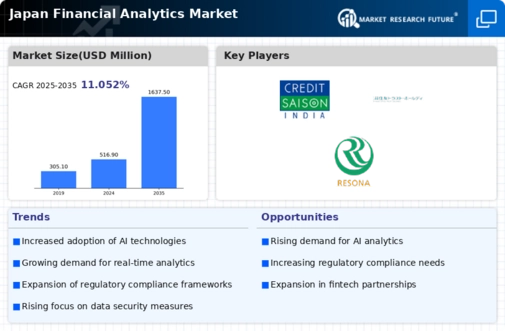The financial analytics market in Japan is characterized by a dynamic competitive landscape, driven by technological advancements and an increasing demand for data-driven decision-making. Key players such as Nomura Holdings (Japan), Mizuho Financial Group (Japan), and SBI Holdings (Japan) are actively shaping the market through strategic initiatives. Nomura Holdings (Japan) focuses on enhancing its digital capabilities, aiming to leverage big data analytics to provide tailored financial solutions. Meanwhile, Mizuho Financial Group (Japan) emphasizes partnerships with fintech firms to innovate its service offerings, thereby enhancing customer engagement and operational efficiency. SBI Holdings (Japan) is pursuing aggressive expansion strategies, particularly in the realm of blockchain technology, which positions it favorably in the evolving financial landscape.
The business tactics employed by these companies reflect a concerted effort to optimize operations and enhance market presence. The competitive structure of the market appears moderately fragmented, with several players vying for market share. However, the collective influence of major firms like Tokyo Stock Exchange (Japan) and Daiwa Securities Group (Japan) contributes to a more concentrated environment, where strategic collaborations and technological investments are pivotal.
In November 2025, Nomura Holdings (Japan) announced a partnership with a leading AI firm to develop predictive analytics tools aimed at improving investment strategies. This move is likely to enhance Nomura's competitive edge by providing clients with advanced insights, thereby fostering greater trust and loyalty. Similarly, in October 2025, Mizuho Financial Group (Japan) launched a new digital platform that integrates AI-driven analytics for real-time market assessments. This initiative not only streamlines operations but also positions Mizuho as a frontrunner in delivering innovative financial solutions.
In September 2025, SBI Holdings (Japan) unveiled a blockchain-based analytics service designed to enhance transparency and security in financial transactions. This strategic action underscores SBI's commitment to leveraging cutting-edge technology to meet the evolving needs of its clients, potentially setting a new standard in the industry.
As of December 2025, the competitive trends within the financial analytics market are increasingly defined by digitalization, sustainability, and the integration of AI technologies. Strategic alliances among key players are shaping the landscape, fostering innovation and enhancing service delivery. The shift from price-based competition to a focus on technological advancement and supply chain reliability is evident, suggesting that future competitive differentiation will hinge on the ability to innovate and adapt to changing market demands.














Leave a Comment